Lea Wait's Blog, page 54
October 6, 2023
MYSTERY GAMES AT TOPSHAM LIBRARY
by Jule Selbo

It was a dark Tuesday night, first week of October, at the Topsham Library. The Mystery Game, set up by Topsham librarian Linda Meadows and MCW Kate Flora, was in progress. Barbara Ross, Dick Cass and I faced the participants/attendees and Ann Cass was super support. She was thrilled to be using a “smart” whiteboard (see photo) that had multiple magic pen colors available with just a tap or two.
The attendees were assembled. I wondered why they chose to spend Tuesday night here.
Did they want to get a glimpse into how mystery writers’ brains work?How we made plot happen?How we built characters and how settings were chosen?Perhaps, they also wanted to know how crime filled our lives even though we looked like regular Joe and Jills who haggled over the best center cut salmon at the fish store or judged diner coffee on how close to dirty water it tasted, or worry if blue or red or green was “the best color” for our skin tones.Were they out for blood?

I asked the attendees if any of them were writers. Emphatically, they shook their heads. “We are readers,” they said.
It was a ‘don’t dare mess with us’ assertion followed by looks that implied, “We’ve read a lot of books, we have opinions, and you can’t pass something lame off on us”.

I didn’t ask for a tally of how many mysteries each of them had read. Could’ve been millions or trillions or billions by the way the looks challenged us.

This was a very serious game to them. Who was going to win?
Writers’ task: Come up with a quality Agatha Christie-Michael Connelly-Arthur Conan Doyle-Dorothy Sayers-Stephen King-esque mystery tale that could/might eventually become a movie that Kenneth Branagh, Dame Judy Dench, Anthony Hopkins, Maggie Smith, Benedict Cumberbatch would want to star in. Or – at least – a story to inspire a lesser quality, American movie like Glass Onion or Knives Out.

 **(I know, Daniel Craig does both British and American mystery movies, but I wanted to poke the bear – perhaps a blog reader will share an opinion on those Rian Johnson-penned movies and let me know I have no taste or sense of humor. But, I’ll stick to my guns – I’m just not a fan.)
**(I know, Daniel Craig does both British and American mystery movies, but I wanted to poke the bear – perhaps a blog reader will share an opinion on those Rian Johnson-penned movies and let me know I have no taste or sense of humor. But, I’ll stick to my guns – I’m just not a fan.)
But back to Tuesday night’s game: Mystery writers had the ball and we were in the hot spot. Weren’t we just supposed to “score” and show we had some talent in this area of story construction?
No. This is a serious game.
Our game plan was to put the opponents off-stride. And yes, we came with a secret support system.
Brightly colored bags. Each was labeled. There was one for Characters, one for Motives, one for Weapons and so on.
And this was when we, those who didn’t want egg on our faces, put the onus back on the readers. Their task: With the 3×5 blank cards they had in their hands, they had to write their suggestions/druthers/imaginings of what weapons were used in the crime, where the mystery took place, names for characters (both protagonist, antagonist, red herrings etc.) and other staples. Then they had to drop those cards in the proper bag.
Our motive in using these colorful bags: Make the attendees feel a little bit responsible for the story that would unfold from their suggestions.
If one of them had put in a 3×5 card suggesting the murderer’s name should be Silly Sally, well, that’s on them.If one of them suggested a space capsule as a location and their card was picked – well – the story was placed there.Or, we might ask the question – how many people could get murdered and/or be suspects in a space capsule?— I just looked it up. Mercury space capsule (1961) held one person.— The Russian Soyuz (1966) held three people.— The largest number of crew members in a space capsule to date is eight*******So the answer is – yeah, you could definitely place a murder there. And the discussions on motives and opportunity and weapon could be interesting.****But I’m digressing.If a location is deemed to not be “working”, it could lead to another card being hauled out of the bag so that the mystery/plot could breathe.Writers used the colorful bags to keep jockeying for position. Another efficient weapon? A constant demand for the readers’ participation.
At first the demand was met with surprise. Perhaps, we writers pondered, the readers wanted to sit back and simply be entertained and presented with a fait accompli.But we were having none of that.

And really, that’s when the fun began. We (readers and writers) were making this story together.
Once that was clear, personalities were unleashed and FLARED! One good idea was followed by another – but it wasn’t smooth sailing. It became clear when IDEA A was presented (such as a suggestion about who would be the victim) and discussed and found its place in the story – it was decimated when IDEA B raised its head.
Just like when writers’ hearts sink when this happens, the readers/attendees got their noses of joint. Letting go of a personal investment in a certain story points was tough. When the murderer’s identity shifted, and new motivations were suggested – tensions (friendly but real) were there, and sparks flew!

A lot of laughter went along with this and I took it as a lesson in human behavior – like my desire that everyone jump on board “my train” that’s going in the direction I choose.
(The lesson to take home: “Stay loose. Stay open.”One of the most fun (to me) insights into the night was this… (names of real attendees are changed to protect the innocent).
Reader Harriet was determined that one of the agreed-on suspects (Elon) was married. And that his wife was invited to the picnic (where an attack happened).Reader Ginny thought it was silly to have an extraneous character and wanted Elon to have romantic designs on one of the other suspects (named Lucy).When Reader Pam determined that Lucy and Stephanie (the cop) were in a romantic entanglement, Elon’s wife was (silently) accepted and she sat (this is my addition) on the picnic blanket next to the potato salad.As the motivations for all the characters to commit the crime were filled in and the story went here and there and upside down and around and thoroughly noshed on –You guessed it.
Who was finally named the MURDERER?
This happened in the last five minutes of the game.
You got it. Elon’s wife.

Now that she was the killer, she was worthy of a name! We had to quickly pull a name out of the colorful Character bag and the 3×5 card read “Ripley”. We all agreed it was an excellent name for a murderer.
In quick fashion, Ripley turned out to be one of the most interesting characters who could be given believable and strong motivations that fit (surprising easily) into the story. She became a dangerous, silent minded villain.
Reader Harriet’s “gut” desire to create a wife (albeit silent) for pharmacist Elon paid off.
There was a quick discussion of how that “gut” shouldn’t be ignored. The readers asked if writers experienced this phenomenon all the time.
Answer: Yep.
Score: Readers: 51
Writers: 49
Or: 
Thanks Topsham Library. It was a blast.
October 4, 2023
SPENDING TIME WITH OLD FRIENDS
When you were a child, did you yearn to go blueberry picking with Sal?

The iconic cover illustration of Sal and her impish smile while she picked (and ate) blueberries in Downeast Maine.
Were you thrilled when deep-water man Burt Dow, his seagull sidekick and his multi-colored boat the Tidley-Idley were swallowed by a whale?
Have you made a pilgrimage to Boston to see the famous ducklings parading across the Public Garden?
Whether Robert McCloskey’s wonderful books were a part of your childhood or if your first introduction to his magic was reading them to your kids, grandkids, nieces or nephews, they likely made an indelible impression on you.
As a youngster, I pretended Sally and Jane were my friends and imagined that I accompanied them on their escapades. My make-believe companions and I were reunited this summer, where the work of their marvelous author and illustrator father is on display at Curtis Memorial Library in Brunswick.

The Illustration Institute and Curtis Memorial Library’s collaboration resulted in a captivating exhibition.

I had a chance to hang out with Nancy Gibson-Nash and Scott Nash on Peaks Island last month during my week-long Illustration Institute residency, which included a reading/writer chat at the Fifth Maine Museum.
Called ROBERT MCCLOSKEY: THE ART OF WONDER, the warm and wonderful exhibition is a collaboration between the library and the Illustration Institute, a Portland-based organization founded and run by Peaks Island residents Scott Nash and Nancy Gibson-Nash, who I’m fortunate to count as dear friends.
As hardworking as they are endlessly creative, they arranged to borrow some of McCloskey’s materials from the May Massee Collection at Emporia State University in Kansas, which houses McCloskey’s original book illustrations, manuscripts and other papers.

Robert McCloskey’s 1941 classic book, Make Way For Ducklings
The Brunswick exhibition, which includes nearly 70 original Robert McCloskey illustrations, focuses on four Maine-set books (Blueberries For Sal, One Morning in Maine, Time of Wonder and Burt Dow, Deep-water Man) and also features extensive sketches of the brood of ducklings made famous by McCloskey’s 1941 award-winning classic, Make Way For Ducklings.
ROBERT MCCLOSKEY: THE ART OF WONDER opened in June and by the end of August, more than 75,000 (!) people had visited. I’m willing to bet most every one of them was wearing a delighted smile when they left the library.
Robert McCloskey’s gentle humor and the brilliant detail of his art bring back happy memories of losing oneself in exquisitely illustrated stories where curious, independent children were encouraged to explore blueberry fields, beaches and sailboats, learning about themselves and their capabilities (and meeting a few bears along the way).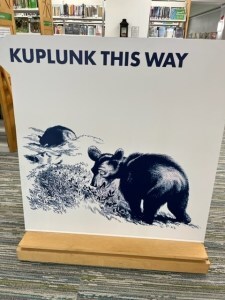
Here’s a link to more information about the exhibition: https://www.illustrationinstitute.org/new-page-5
It’s recently been extended through the end of October. It’s free, it’s fun, and it’ll stir many happy memories. Don’t miss it!
Brenda Buchanan brings years of experience as a journalist and a lawyer to her crime fiction. She has published three books featuring Joe Gale, a newspaper reporter who covers the crime and courts beat. She’s now hard at work on new projects. FMI, go to http://brendabuchananwrites.com
October 3, 2023
Adventures in Research
Kate Flora: When I embarked on my crime writing journey back around 1983, I naively thought that what a writer did was sit at her desk and make things up. It didn’t take long for the crime writing (and reading) community to set me straight. In our world, we are writing for a sophisticated audience. Our readers pay attention to details. They analyze our plots. They watch us like hawks. We quickly learn that we’re supposed to get things right.
 You want to poison someone? You probably ought to get a book about poisons. I remember at one of my husband’s Harvard reunions, I found myself sitting next to an ER doc, so I described the poison I was using in the book and asked what symptoms my character would experience when she showed up in the ER. She was happy to answer the question. As to poisons, we in the mystery world are extremely lucky to have a friendly toxicologist who is always willing to answer questions. Luckily for all of us, “the poison lady” doesn’t find our questions disturbing at all.
You want to poison someone? You probably ought to get a book about poisons. I remember at one of my husband’s Harvard reunions, I found myself sitting next to an ER doc, so I described the poison I was using in the book and asked what symptoms my character would experience when she showed up in the ER. She was happy to answer the question. As to poisons, we in the mystery world are extremely lucky to have a friendly toxicologist who is always willing to answer questions. Luckily for all of us, “the poison lady” doesn’t find our questions disturbing at all.
Which is why, when I was writing my novella, Girls’ Night Out, where a woman’s book group takes revenge on a serial date rapist by drugging his drink, I was able to learn what combination of drugs, including herbal performance enhancers, would incapacitate him.
When I decided to write police procedurals, I had a lot to learn. There are no cops in my family. Like most people, my only interaction had been once when blue lights appeared in my rearview mirror. Now I had to spend time with cops and, hopefully, establish enough rapport to ask my questions. On my first ride-along, the officer who set it up basically said, “They don’t want you there. So keep your mouth shut and just watch.” It worked for a while, but there were things I needed to know, so I asked, “What are you seeing that I’m not seeing?” It opened the door to a fascinating night on the streets of Portland.
One adventure in research resulting from my casual remark that I’d never fired a handgun resulted with me in the basement of a police department. With no ear protectors to be found, I was given two bullets to put in my ears. Yes. Seriously. This really happened. It seems that sometimes my law enforcement teachers have more faith in me than I have in myself.
Another adventure, while research Finding Amy, involved walking down a crumbling

Wardens walking down the tote road to search for Amy.
woods road to the spot where her body was found. The day had gone from brilliantly sunny to gray and icy and I stopped on my way to Portland, ran into Goodwill, and bought a jacket. It was spooky and unnerving but it gave me a better understanding when, in my interviews, the detectives described the cold, dark December night when they finally found and exhumed the body.
 In doing research for Death Dealer: How Cops and cadaver dogs brought a killer to justice, I mentioned to the detective I was working with that I’d like to see where Maria Tanasichuk’s body was found. “Sure,” he said. He gave me a helmet, backed two four-wheelers out of the police garage, and said “follow me.” I had never been on a four-wheeler, but off I went. Going to the spot, passing the place where a witness lived, and seeing why it was so difficult for searchers and their cadaver dogs to find the body, illuminated the story in a way no imagination could have.
In doing research for Death Dealer: How Cops and cadaver dogs brought a killer to justice, I mentioned to the detective I was working with that I’d like to see where Maria Tanasichuk’s body was found. “Sure,” he said. He gave me a helmet, backed two four-wheelers out of the police garage, and said “follow me.” I had never been on a four-wheeler, but off I went. Going to the spot, passing the place where a witness lived, and seeing why it was so difficult for searchers and their cadaver dogs to find the body, illuminated the story in a way no imagination could have.
A few years back, at the marvelous Writer’s Police Academy, I got to go on a ride-along with a cop down in Greenville, North Carolina. It was a quiet night and we were in a semi-rural area. It looked like nothing was going to happen. Then we passed a man walking along the road and the officer turned the car around and went back and asked him some questions. Things seemed okay, so we went on our way, but when I asked about the stop, he told me a story.
A while back, he’d been patrolling this area and seen a man walking along the road. It was very late at night and there was nothing around, so he stopped. He said the man was carrying something like a little notebook or pouch. He got ID and went back to the cruiser to check and learned that the man was wanted on a federal warrant. When he got back out to tell the man he had to arrest him, the man pulled out a gun and started shooting. The officer wasn’t hit; the bad guy was, and back-up came and took the man away. He then went on to show me the dash cam video of the shooting and describe how the department had handled the aftermath. The emotional intensity. His call to his wife to let her know he was okay. Then we went back to the station and talked to his sergeant about it, and about how important it was to be aware of the trauma involved in a shooting. So that night nothing happened and I got an amazing insight into a police officer’s reality and into a deadly force incident.
A few Joe Burgess books ago, I was sending Burgess and Kyle into a convenience store. They saw a young wanna be gangster heading into the store with a tell-take bulge in his hoodie pocket that said he had a gun. I realized that I didn’t know: a) how Burgess and Kyle would approach the situation and b) how they would deal with the store clerk who was traumatized by being held at gunpoint. So I called my advisors, Joe Loughlin and Roger Guay, and asked them what to do. I’m pleased to say that only a bag of potato chips got injured in the confrontation.
I could go on with stories, but this gives you a taste. I’ve been extremely lucky that the people I call my “training officers” have been so willing to trust me and share their stories. It definitely illuminates my work.
October 1, 2023
Theft, Piracy, or Plagiarism
Kaitlyn Dunnett/Kathy Lynn Emerson here. Like many of my fellow writers, I’ve recently been able to check a data base to find out if any of my books were used to “train” artificial intelligence to, essentially, replace live writers. Am I overstating that? I don’t think so. Neither do the screenwriters recently on strike, or their actor counterparts. Neither do several groups of writers who have banded together to launch class-action lawsuits over the matter.
For simplicity, I’ll just use the term AI rather than name companies or programs. In theory, AI is just a tool, but the possibilities for misuse are legion. Students using it to do their homework for them is one that’s been discussed for a while now. At least one program has already been designed to spot AI generated papers. But the real problem is that AI is unregulated. It is still too new to have checks and balances in place, let alone laws defining its limits.
It’s a big issue, in which I am now reluctantly involved. Without asking my permission, or offering me any payment for their use, the entities behind one or more programs for “creating” written works (business letters to novels to student papers to, potentially, anything involving the written word), fed two of the novels I wrote as Kaitlyn Dunnet (Scone Cold Dead and Ho-Ho-Homicide) and two penned as Kathy Lynn Emerson (Face Down below the Banqueting House and Murder in the Queen’s Wardrobe) into their system. They claim this is “fair use” of that material. Silly me—I always thought “fair use” was a term used to refer only to the fraction of a whole, along the lines of a paragraph or two from a novel, as quoted in a review.

Whether this is theft, piracy, plagiarism. copyright infringement, or fair use, this is a very personal issue to writers like me. Let me pose a hypothetical question. What if an AI user asks an AI program to write a novel “in the style of Kaitlyn Dunnett” and the result bears a strong resemblance to the seventeen novels I wrote under that name? It could very well happen. I already feel violated by the unauthorized use of my words. Creating an imitation Kaitlyn Dunnett novel strikes me as, at the least, theft of my intellectual property. If it’s poorly written, as it’s bound to be, it also tarnishes my reputation as a writer.
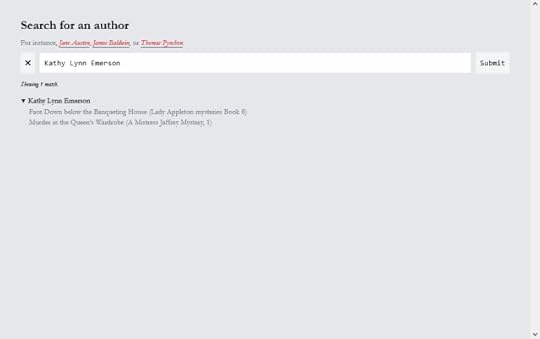
As it happens, fellow historical mystery writer Sharan Newman took this hypothetical situation a step further and asked an AI program to write a story in her style. The result was worse than she’d expected, “a pitch, with a hook at the end. But it was in my style and cadence.” It used the names of her series characters and placed them in situations that might have fit into the series, but their backstory was inaccurate. Sharan describes the text as taking “words and places” from her books and adding in some “popular plots.” In a Facebook post last week, she also reported that “this machine imitates my style but NOT my knowledge. Anyone reading one of these pastiches would think I knew nothing about medieval life.” Since she is a medieval scholar as well as a mystery writer, I don’t blame Sharan for being angry, especially after she asked AI for other stories and found they contained even worse mistakes than the first.
I don’t know what’s going to happen over this issue, but I do know that a whole lot of creative people are hopping mad at the thought that their unique output has been appropriated without their consent. Alex Reisner has made a study of the situation for The Atlantic. The two links below will take you to his articles on the subject, but you’ll have to sign in to read them for free. The gist is that he “acquired a data set of more than 191,000 books that were used without permission to train generative-AI systems by Meta, Bloomberg, and others.”
https://www.theatlantic.com/technology/archive/2023/08/books3-ai-meta-llama-pirated-books/675063/
This article gives a brief summary of the findings:
https://bleedingcool.com/comics/authors-discover-pirated-versions-of-their-books-used-to-train-meta-ai/ and contains this link
https://full-stack-search-prod.vercel.app/
where you can search, by author, to see what books were used to in the “training.” It’s slow and has a few glitches, but this is where the two screen shots illustrating this article came from. As an aside, since this is Maine Crime Writers, our late colleague Lea Wait has four of her mysteries in the data base. Although she’s no longer with us, her copyright extends many decades after her death, so that’s no excuse for using her work without permission.
This next link is to the Author Guild’s advice on what writers can do about the situation. Unfortunately, there isn’t much at the moment. The creators of AI can just ignore our letters and complaints until the courts decide the matter.
https://authorsguild.org/news/you-just-found-out-your-book-was-used-to-train-ai-now-what/
The two links below will take you to information on the class action lawsuits and what “fair use” means based on recent court cases
This second article makes the case that the argument that AI training is “fair use” will likely win in court
I hope this guy’s opinion is wrong. If it isn’t, I hope that some kind of regulation can be instituted to protect human writers. The screenwriters have a union. Those of us who write fiction and nonfiction for the print/e-book market do not. The Authors’ Guild is a professional organization, not a union. We can’t strike. We can be made redundant. I very much fear that AI will drive human writers out of writing, since it’s already difficult for us to make a living.
Books will still be published, but of what quality? If AI-generated books are allowed to proliferate unchecked, writers aren’t the only ones who will suffer. Readers will too.
Comments are welcome.

Kathy Lynn Emerson/Kaitlyn Dunnett has had sixty-four books traditionally published and has self published others. She won the Agatha Award and was an Anthony and Macavity finalist for best mystery nonfiction of 2008 for How to Write Killer Historical Mysteries and was an Agatha Award finalist in 2015 in the best mystery short story category. In 2023 she won the Lea Wait Award for “excellence and achievement” from the Maine Writers and Publishers Alliance. She was the Malice Domestic Guest of Honor in 2014. She is currently working on creating new omnibus e-book editions of her backlist titles. Her website is www.KathyLynnEmerson.com.
September 29, 2023
Weekend Update: September 30-October 1, 2023
 Next week at Maine Crime Writers there will be a posts by Kaitlyn Dunnett/Kathy Lynn Emerson (Monday), Kate Flora (Tuesday), Brenda Buchanan (Thursday), and Jule Selbo (Friday).
Next week at Maine Crime Writers there will be a posts by Kaitlyn Dunnett/Kathy Lynn Emerson (Monday), Kate Flora (Tuesday), Brenda Buchanan (Thursday), and Jule Selbo (Friday).
In the news department, here’s what’s happening with some of us who blog regularly at Maine Crime Writers:
It’s Maine Crime Writers “Where Would You Put the Body?” contest – late summer/early fall edition. How do you enter? Send a photograph of your chosen spot to: WritingAboutCrime@gmail.com with “Where Would You Put the Body?” in the subject line. There will be prizes for First, Second, and Third place–books of course and other Maine goodies. You may enter no more than three photographs, each one entered separately. They must be of Maine places and you must identify the place in your submission. Photos must be the submitter’s original work. Contest will run through October 15.
Matt Cost will be doing an October book tour. For one week. On October 3rd, he will be in conversation with author Jon McCarthy at the Madison Public Library at 6:30 p.m. On October 4th, he will be at the Windham Public Library at 6:00 p.m. speaking about the evolution of a book. He will be doing this same talk the next afternoon at the Auburn Public Library at 4:00 p.m. On October 7th from 1:00-3:00 p.m. Cost will be signing books at the Barnes & Noble in Brunswick. On Sunday, October 8th, he will be traveling to Ipswich, Massachusetts to attend, sign, & sell books at the Language Lives Festival from 11:00 a.m. to 6:00 p.m.
On Tuesday, October 3rd at the Topsham Library it’s Making a Mystery with Dick Cass, Jule Selbo, and Barbara Ross. Using prompts from the audience for character names, occupations, setting, motive, and weapons, they, along with the audience, will compose a mystery on the fly. Along the way, the authors will speak about their process and the types of mysteries they write.
A invitation to readers of this blog: Do you have news relating to Maine, Crime, or Writing? We’d love to hear from you. Just comment below to share.
And a reminder: If your library, school, or organization is looking for a speaker, we are often available to talk about the writing process, research, where we get our ideas, and other mysteries of the business, along with the very popular “Making a Mystery” with audience participation, and “Casting Call: How We Staff Our Mysteries.” We also do programs on Zoom. Contact Kate Flora
September 28, 2023
What We’re Reading
Our group post this month is designed to share some of the books we’ve recently read and enjoyed. Please feel free to add your own suggestions in the comments.
Kaitlyn Dunnett/Kathy Lynn Emerson: I’ve been rereading Lindsey Davis’s wonderful Marcus Didius Falco mysteries. I read each one once before, when it first came out, but since that’s a couple of decades ago for most of the entries, I’m able to enjoy that feeling of a first-time read all over again. Falco is a Roman “informer” in the reign of Vespasian, and his adventures take him all over the Roman empire, even to Britain, which Davis, who is English, enjoys poking fun at for its barbarian ways. Since the narration is “translated” into modern English, Falco bears a strong resemblance to a typical hard-boiled detective at the start of the series, but he mellows into a more traditional sleuth (and a family man) as it continues. I’m currently reading #16, Scandal Takes a Holiday, first published in 2005.
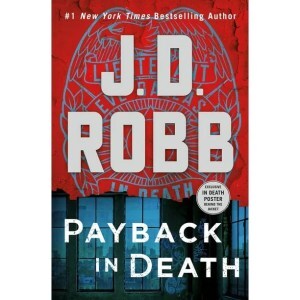
For variety, I’ve also read several new releases, including James R. Benn’s Proud Sorrows (World War II setting, but this time taking place in an English country house rather than at the front), Charlaine Harris’s All the Dead Shall Weep (part of a series set in an alternate universe where it is still sometime in the early twentieth century and the U.S. has been broken into five separate countries), and J. D. Robb’s Payback in Death. The latter is the latest in her long-running series set in the not-too-distant future. The detective is police lieutenant Eve Dallas. Like all the “in death” books, it is fast paced and twisty, but justice triumphs in the end.
John Clark just finished The Name Drop and A Multitude of Dreams and has several others in various stages of being read.


Maggie Robinson: The fourth installment of Richard Osman’s Thursday Murder Club books came out last week, and I read The Last Devil to Die in two nights. These books are exceptional, multi-point-of-view, kind-of-cozy-yet-not-at-all-cutesy, with numerous laugh-out-loud moments. This one made me cry a bit, too, and I won’t spoil why. They are set in a posh British retirement village, and the four main characters (“pensioners”) are diverse in background and very real; Osman does an excellent job getting into all their heads and bringing us along. The supporting characters–and they are characters–are very well-drawn too. You can start with Book 4, but it’s far more fun to see the clever, crazy situations that begin it all in Books 1, 2, and 3. Highly, highly recommended.
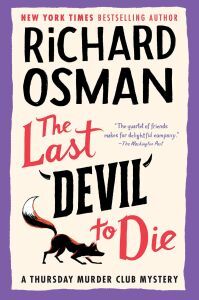
Matt Cost just had the pleasure of reading Aventurine On the Bailgate by Anne Britting-Oleson. There is nothing worse than writer’s block unless you count theft, murder, and being framed for all of the above. Looking for inspiration that will open the floodgates of creative thought, Aventurine stumbles into a friendship that leads to a missing woman who might be her doppelganger, albeit ten years younger. In quick succession, there is a murder, a theft, a sexy detective, a former lover, the arrival of her friend, the spy, and things spiral rapidly out of control. Anne Britting Oleson sets the skillet to sizzle, adds a variety of ingredients, spices it up a bit, and lets the heat do the work to cook up a plate of intrigue, mystery, desire, and chicanery.
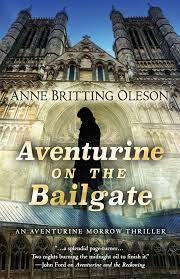
Kate Flora: In the car, my husband and I are listening to the Mick Herron Slow Horses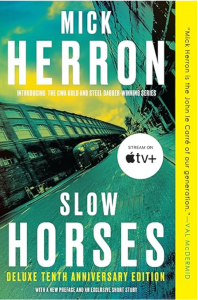 series, which I’m really enjoying. Sometimes the plots feel slow but I love his witty writing and have become attached to his Slow Horses characters. Also just finished listening to S.A. Cosby’s All the Sinners Bleed. His writing is so powerful and dark and daring. In the world of fiction that isn’t mystery, Abraham Vergese’s The Covenant of Water, because I absolutely loved his book from twelve years ago, Cutting for Stone. Readers beware, though, if you like to read in bed, because it is a 700 page tome and may crush you. Friends tell me that he narrates the audio version, so that might be a better choice.
series, which I’m really enjoying. Sometimes the plots feel slow but I love his witty writing and have become attached to his Slow Horses characters. Also just finished listening to S.A. Cosby’s All the Sinners Bleed. His writing is so powerful and dark and daring. In the world of fiction that isn’t mystery, Abraham Vergese’s The Covenant of Water, because I absolutely loved his book from twelve years ago, Cutting for Stone. Readers beware, though, if you like to read in bed, because it is a 700 page tome and may crush you. Friends tell me that he narrates the audio version, so that might be a better choice.
Of course, we are very curious about what you are reading, too, so please share in your comments.
Ready to Launch by Kait Carson
 My latest book, Death Dive, the third in the Hayden Kent series launched on September 19th. The days preceding a new release are hectic. There’re interviews to complete, guest blogs to arrange, a social media campaign to set up and implement. Much of this begins well before the launch month. As an indie author who has sent two other books into the universe in 2023, many of these actions are on autoplay. I never took dance lessons at Arthur Murray, but I know all about the painted feet on the floor. Follow them and you’re foxtrotting before you know it. All except for the kick. You have to learn the kick on your own.
My latest book, Death Dive, the third in the Hayden Kent series launched on September 19th. The days preceding a new release are hectic. There’re interviews to complete, guest blogs to arrange, a social media campaign to set up and implement. Much of this begins well before the launch month. As an indie author who has sent two other books into the universe in 2023, many of these actions are on autoplay. I never took dance lessons at Arthur Murray, but I know all about the painted feet on the floor. Follow them and you’re foxtrotting before you know it. All except for the kick. You have to learn the kick on your own.
Everything perked along well through August. Then came September. Sure. I knew I’d have the Labor Day weekend to contend with. No worries! The book is set in the tropics. Perfect timing to snag an audience looking to extend summer vacation into the school year. Hold that thought. This is where it all gets dicey. Here comes LIFE. The author of the inescapable monkey wrench in the works. Time to learn that kick I mentioned above.
 The day after Labor Day, I headed to the Humane Society to drop off a box of books for their silent auction. I’ve had essays published in the Chicken Soup series, the latest in Lessons Learned from My Cat. The tie in was obvious. The Shelter Manager greeted us with glee, and the words that she had found the dog my husband wanted. She came out from her office holding a ten-pound Cavapoo. The exact dog, in the exact color, that my husband described to her two years before. He was a brand-new intake, about three months old.
The day after Labor Day, I headed to the Humane Society to drop off a box of books for their silent auction. I’ve had essays published in the Chicken Soup series, the latest in Lessons Learned from My Cat. The tie in was obvious. The Shelter Manager greeted us with glee, and the words that she had found the dog my husband wanted. She came out from her office holding a ten-pound Cavapoo. The exact dog, in the exact color, that my husband described to her two years before. He was a brand-new intake, about three months old.
Amid book launch duties, the new puppy added housebreaking, socializing with four rambunctious cats, and amassing puppy stuff to the to do list. Despite the disruption, launch plans were ticking along nicely. Until a few days later, when my barking cough vied with Buster’s yipping. All energy ground to a halt. Like a Victorian heroine, I took to my bed, unable to put two coherent words in a simple sentence.

NASA via Unsplash
Recovery was slow, but steady. By the time I was up and around, the Amazon file was ready to be finalized and a major marketing push begun. You’ve heard of Hurricane Lee? It was knocking at our door. As a former Floridian, hurricanes hold little mystery. I checked the water supply. We made sure the generator was ready to go and got on with life. As I was scheduling Kindle promotions and finalizing my newsletter, the power failed. It stuttered on and off for the next two days.
My area of Aroostook County escaped the worst of Lee’s wrath. Not so in Coastal Maine and Nova Scotia. In the overall scheme of things, the struggle to launch Death Dive seems inconsequential. Amazon will release the book whether I have power or not. Prearranged ads will do the same. As with writing, it’s all about perspective.
By the time this blog appears, Death Dive will be out in the world. It’s always fun to experience the birth of a new book. This one is all the sweeter for its complications and lessons.
September 25, 2023
Women Crime Writers
by Charlene D’Avanzo
The list of famous female crime writers is long and storied – Agatha Christie, Ann Cleeve, Elly Griffiths, Margaret Atwood, Margery Allingham, Donna Andrews, Janet Evanovich, Elizabeth George, Sue Grafton, P.D. James, Donna Leon, Dorothy Sayers – I could go on but you get the idea.
Why is this? Some say, and I agree, that reading crime fiction by women is a powerful feminist act – it has been called agency and control in action. This is not to say that men don’t write terrific stories that feature female sleuths – of course they do. The poiint is that for some of us there’s a special power in women’s writing and reading their own stories.
Crime fiction written by women tends to celebrate female resilience – stories in which we make decisions, put the wrongs right, and sometimes make mistakes and act badly in the process. As a female reader I do identify with a female sleuth. She’s working hard to make the world a better place but she’s also juggling her own realities – figuring out what’s for dinner or whether her teenager is smoking pot. At the same time, she’s often the one who speaks for the victim.
This is certainly the case in my own mysteries. In Secrets Haunt the Lobster’s Sea, for example, protagonist Mara Tusconi’s cousin Gordy is the number one suspect in a lobsterman’s murder. To prove Gordy’s innocence Mara jumps into the rought-and-tumble world of Maine’s signature fishery when she visits Macomek Island where lobstermen practice their own rule of law – and where they certainly don’t welcome outsiders.
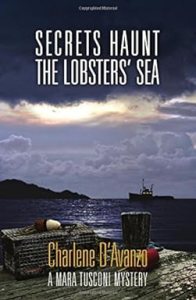
And in Glass Eels, Shattered Sea, Mara, along with Gordy, confront the very lucrative but also very deadly world of international eel trafficking. In all this Mara pushes through her fear because what she’s doing is right.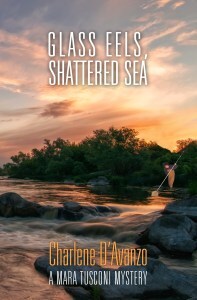
September 24, 2023
Put next week’s Maine Book Fest 2023 on your dance card
It seems as though literary and book festivals are springing up all over Maine. That’s a good thing! The more opportunities there are for writers, readers and book lovers to get out there and show their love, the better.
A new one is making its debut next week. The Maine Book Fest, in Hallowell, is organized by Maddie Smith, the 22-year-old entrepreneur behind The Banned Bookstore, an online shop that sells books that have been banned or censored, as well as books that haven’t been.
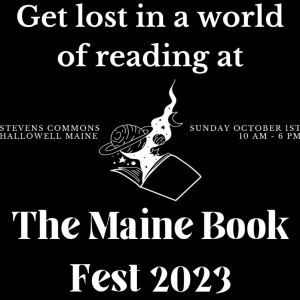 The festival Smith has put together is remarkable — more than 30 authors, book-related vendors and literary organizations will be in the marketplace. There are also forums and reading throughout the day. And live music! And a food truck!
The festival Smith has put together is remarkable — more than 30 authors, book-related vendors and literary organizations will be in the marketplace. There are also forums and reading throughout the day. And live music! And a food truck!
There is no admission charge. There will be a raffle, with proceeds going to suppport future Maine Book Fests.
I will have a booth at the Fest, as will fellow Maine Crime Writer Vaughn Hardacker. Vaughn is also reading in the afternoon.
The mission of the event is to encourage reading, literacy and education in Maine, as well as “cultivate a strong and confident community of readers, writers, and creatives.”
The Maine Book Fest is from 10 a.m. to 6 p.m. (the marketplace opens at noon), Sunday, Oct. 1, Stevens Commons, Hallowell. Check out the schedule at themainebookfest.com.
I know how frightening it is for people in the Portland area and south of there to venture above the Freeport line, but I assure you it’s only a 45-minute drive up Interstate 295. Hallowell is a civil and urbane city that you will feel right at home in. Not scary at all!
As writers, we, too, should have a mission to encourage reading and literacy. Obvious, right? By supporting events like The Maine Book Fest, we are helping to make our great state a better place to write, read and live. See you there!
September 22, 2023
Weekend Update: September 23-24, 2023
 Next week at Maine Crime Writers there will be a posts by Maureen Milliken (Monday), Charlene D’Avanzo (Tuesday), Kait Carson (Thursday), and a group post (Friday).
Next week at Maine Crime Writers there will be a posts by Maureen Milliken (Monday), Charlene D’Avanzo (Tuesday), Kait Carson (Thursday), and a group post (Friday).
In the news department, here’s what’s happening with some of us who blog regularly at Maine Crime Writers:
Sad news to report on one of our earliest regular contributors to Maine Crime Writers. Jim Hayman, author of a highly successful mystery series passed away earlier this month. You can read his obituary at https://www.pressherald.com/2023/08/13/obituaryjames-henry-harry-hayman-2/ and find his posts in the sidebar under “Jim’s Posts.” Our deepest condolences to his family.
It’s Maine Crime Writers “Where Would You Put the Body?” contest – late summer/early fall edition. How do you enter? Send a photograph of your chosen spot to: WritingAboutCrime@gmail.com with “Where Would You Put the Body?” in the subject line. There will be prizes for First, Second, and Third place–books of course and other Maine goodies. You may enter no more than three photographs, each one entered separately. They must be of Maine places and you must identify the place in your submission. Photos must be the submitter’s original work. Contest will run through the middle of October.
An invitation to readers of this blog: Do you have news relating to Maine, Crime, or Writing? We’d love to hear from you. Just comment below to share.
And a reminder: If your library, school, or organization is looking for a speaker, we are often available to talk about the writing process, research, where we get our ideas, and other mysteries of the business, along with the very popular “Making a Mystery” with audience participation, and “Casting Call: How We Staff Our Mysteries.” We also do programs on Zoom. Contact Kate Flora
Lea Wait's Blog
- Lea Wait's profile
- 509 followers







